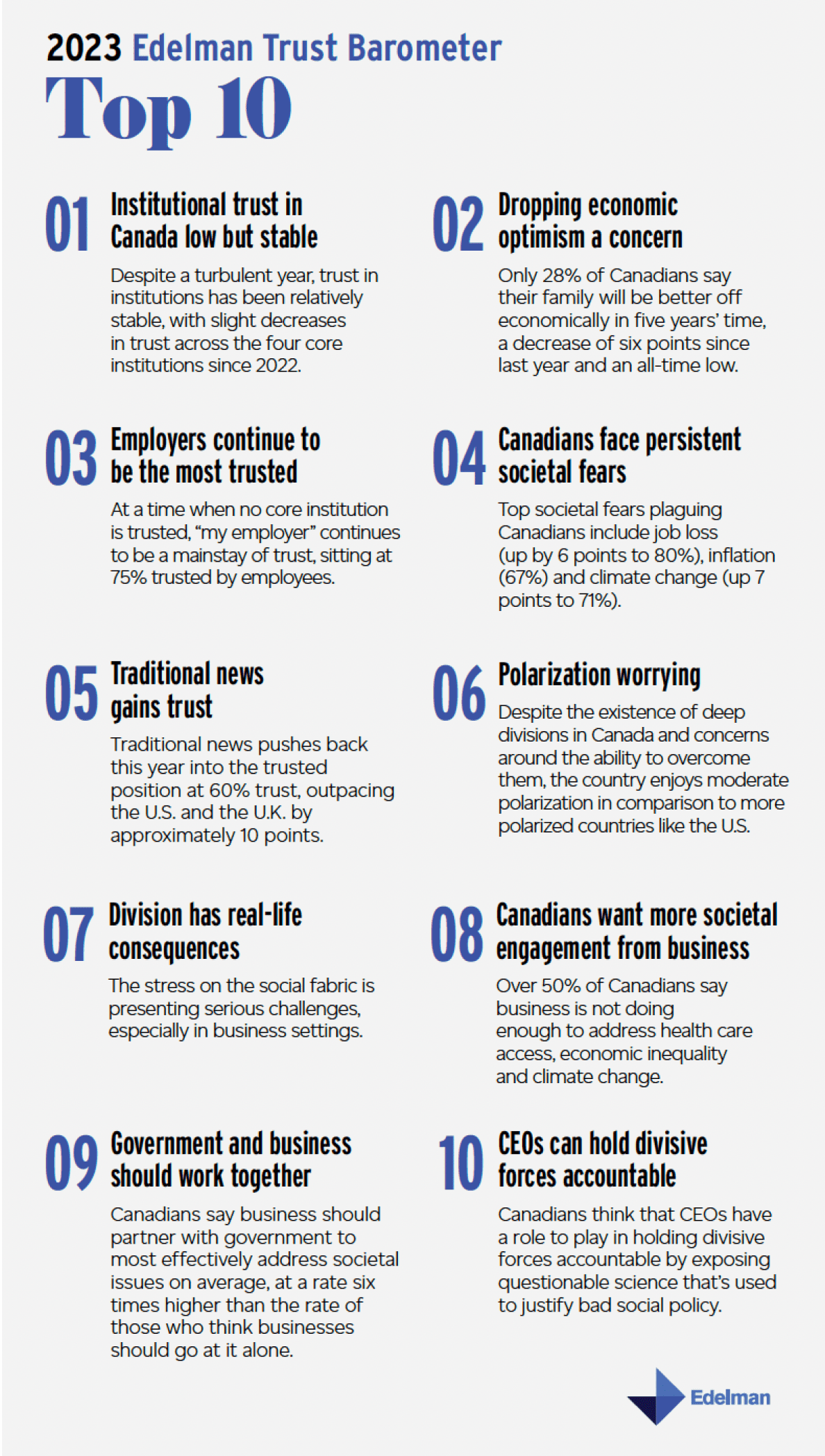For 23 years, the Edelman Trust Barometer has served as a key pillar in the global understanding of how trust underpins working democracies, businesses, societies and the world. For the 2023 edition, we surveyed people in 28 countries in November 2022, including in English Canada and Québec (the province of Québec commissions its own Barometer).

Here’s what we discovered:
Drop in economic confidence
In Canada, institutional trust slipped slightly, but economic confidence has dropped. Only 28% of respondents say they think their families will be better off in five years, an all-time low. Canadians are feeling the effects of inflation, pressure from the cost of living and stress from a softening housing market. These headwinds have them worried about their long-term finances. This is a global trend, with 24 of the 28 countries surveyed at an all-time low for this question.
Plenty of insights are waiting for you!
Sign up for INCITE and receive 3 free print issues a year.
Sign up for INCITETrust in “my employer”
Canadians trust in the key institutions of business, government, media and NGOs has dropped slightly, by an average of 2%, year over year. That puts Canada in the neutral category with countries like Brazil, the Netherlands and Colombia. Compared to countries like the United States and the United Kingdom, Canadians’ trust in government and the media is significantly higher.
But what really sticks out is trust in “my employer” which remains strong at 75%, making it one of the institutions Canadians trust the most. This is a trend that started during the pandemic, when people turned to their employers for reliable information about the virus, vaccines and health care guidelines, and has remained strong.
Trust in earned media
In addition to economic concerns like job security and inflation, Canadians are worried about existential societal fears like climate change and food shortages, a likely consequence of supply chain issues. In this volatile context, Canadians are turning to traditional media for trustworthy information, with the trust level going up to 60%. In Quebec, that number was slightly higher. This stands in stark contrast to counties like the U.S., which is at 48% for traditional media.
Canada’s newsrooms have stuck to their missions as truth-tellers, doubling-down on fact-checking and responsible reporting. This puts our democracy on a surer footing.
Polarized, but not entrenched
Canadians are feeling the economic pinch and the gap between the rich and the poor is widening. People feel like the system is stacked against them and are looking to shake things up.
The Trust Barometer data demonstrates that while Canadians are polarized in their beliefs, they’re not entrenched, meaning they have the healthy level of polarization you expect in a democracy wherein people can debate and disagree about the pressing issues of the day.
But while it’s important to note that Canadians are faring better in terms of polarization than many places in the world, 60% still feel like they’re more divided today than in the past. Canadians don’t want to slip into entrenched polarization, in which they can no longer discuss our opinions and come together for solutions.
Canadians are worried about the potential consequences of increasing polarization. Further, there are striking numbers here around how division might be impacting everyday life. When asked, only 19% responded they would be willing to have a co-worker with whom they strongly disagreed with. Only 26% said they’d be willing to help someone they strongly disagreed with if they were in need.
When I see this as a business leader, I think of what it means for organizations that bring different people together. At Edelman, we try to embrace our diversity as a strength, and we’re committed to leaning into uncomfortable conversations so we can move forward together.
Opportunity for business
Businesses have an opportunity to lead on key issues important to Canadians and create space for dialogue on important issues like health care, climate change and economic insecurity. In the past, we have encouraged business leaders to step out on societal issues with a louder and more committed voice. What is more important now is the action taken before that: What internal decisions are you making that impact employees and society, and how are you communicating them in clear, transparent and effective ways. Only positive action earns trust.
It’s worth pointing out that the onus isn’t on business to fix all the problems. Canadians expect companies to partner with government to work on solutions, at a rate six times higher than the rate of those who think businesses should go at it alone. They’re looking to businesses and government to come together to find pragmatic solutions to bridge gaps and build consensus.
Of course, as we’ve seen, there is a risk in jumping into hot-button issues. But there are ways businesses can insulate themselves from criticisms of being too political.
According to Canadians, the best way to do that is to be a trustworthy source of information, base actions on science and act on the same values over time.
Canadians think that CEOs have a role to play in holding divisive forces accountable, with 59% wanting to see CEOs support politicians and the media that build consensus and cooperation. CEOs are expected to help inform and shape conversation and policy debates on a range of issues, including the fair treatment of employees along with action on climate change and discrimination. They want Canadian businesses to be on the right side of history.
As a key trusted institution, business has a responsibility to drive productive solutions to make life better for everyone. Businesses can halt the slide of polarization by partnering with government and build confidence by investing in fair compensation and committing to long term diversity and inclusivity initiatives.
As businesses, we need to be ambitious to ease the impact of our current and future challenges. We can do hard things better, together.
Learn more about the Edelman Trust Barometer. #TrustBarometer: All data is based on a general population sample unless otherwise noted.
Expertise you can count on
We have the secret to building lasting relationships with Canadians.
Let’s chat